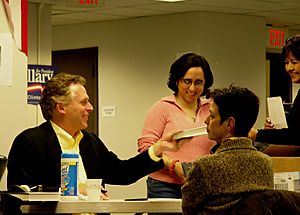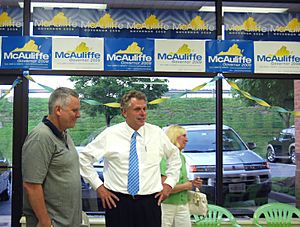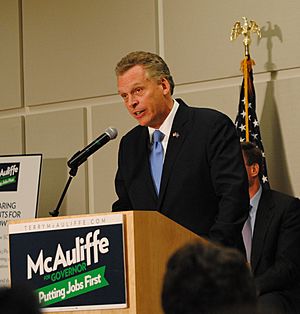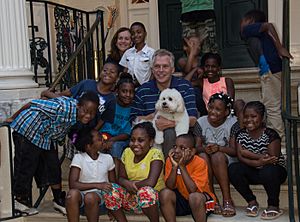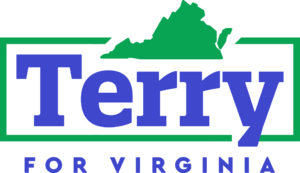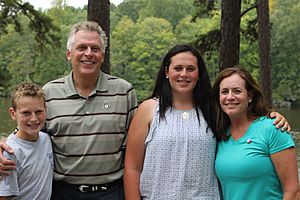Terry McAuliffe facts for kids
Quick facts for kids
Terry McAuliffe
|
|
|---|---|
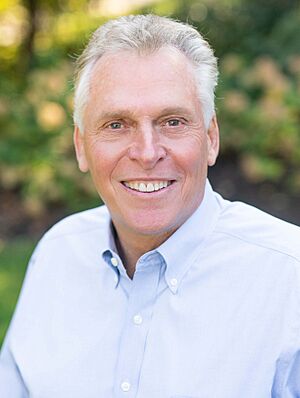
McAuliffe in 2020
|
|
| 72nd Governor of Virginia | |
| In office January 11, 2014 – January 13, 2018 |
|
| Lieutenant | Ralph Northam |
| Preceded by | Bob McDonnell |
| Succeeded by | Ralph Northam |
| Chair of the National Governors Association | |
| In office July 17, 2016 – July 16, 2017 |
|
| Deputy | Brian Sandoval |
| Preceded by | Gary Herbert |
| Succeeded by | Brian Sandoval |
| Chair of the Democratic National Committee | |
| In office February 3, 2001 – February 12, 2005 |
|
| Preceded by | Ed Rendell (General Chair) Joe Andrew (National Chair) |
| Succeeded by | Howard Dean |
| Personal details | |
| Born |
Terence Richard McAuliffe
February 9, 1957 Syracuse, New York, U.S. |
| Political party | Democratic |
| Spouse |
Dorothy Swann
(m. 1988) |
| Children | 5 |
| Education | Catholic University of America (BA) Georgetown University (JD) |
| Signature |  |
Terence Richard McAuliffe (born February 9, 1957) is an American businessman and politician. He served as the 72nd Governor of Virginia from 2014 to 2018. He is a member of the Democratic Party.
McAuliffe has been a major figure in the Democratic Party for many years. He helped with President Bill Clinton's reelection campaign in 1996. He was also the chairman of the Democratic National Committee (DNC) from 2001 to 2005. Later, he was the chairman of Hillary Clinton's presidential campaign in 2008.
In 2013, McAuliffe was elected governor of Virginia. Virginia's law does not allow governors to serve two terms in a row. So, after his term ended, his lieutenant governor, Ralph Northam, became the next governor. McAuliffe ran for governor again in 2021 but lost to Republican Glenn Youngkin.
As governor, McAuliffe focused on improving Virginia's economy. He also restored voting rights to many people who had finished their prison sentences. He is known for vetoing a record number of bills from the state legislature. A veto is when a governor rejects a bill to prevent it from becoming a law.
Contents
Early Life and School
Terence Richard McAuliffe was born in Syracuse, New York. His father was a real estate agent and was also involved in local politics. His family has an Irish background.
When he was just 14, he started his own business sealing driveways. He graduated from high school in 1975. He then went to the Catholic University of America and earned his bachelor's degree in 1979.
After college, he worked for President Jimmy Carter's reelection campaign. At age 22, he became the national finance director. He later attended Georgetown University Law Center and earned a law degree in 1984.
Business Career
McAuliffe was a successful businessman before and during his political career. In 1985, he helped start a local bank in Washington, D.C. At age 30, he became its chairman, the youngest in the bank association's history.
He also worked in real estate and home building in Florida. In 1996, he bought a home-building company called American Heritage Homes. He turned it into one of the biggest home builders in Central Florida.
McAuliffe has said that he met many of his business contacts through his work in politics. He earned millions of dollars from his work as a banker, real estate developer, and investor.
Early Political Career
Working with the Clintons
McAuliffe had a close relationship with President Bill Clinton and his wife, Hillary Clinton. He was a very successful fundraiser for the Democratic Party. He helped raise a record-breaking $275 million for the Clintons' political goals.
After Bill Clinton left the presidency, McAuliffe helped the Clintons get a mortgage for their new home. He also served on the board of the Clinton Foundation, a charity organization, from 2004 to 2013.
Leader of the Democratic Party
In 2001, McAuliffe was elected chairman of the Democratic National Committee (DNC). The DNC is the main organization for the Democratic Party in the United States. He served as chairman until 2005.
During his time as chairman, the DNC raised over $578 million. For the first time in its history, the party had no debt. He also created the party's first national database of voters, which contained over 175 million names. This helped the party connect with voters across the country.
Running for Governor in 2009
In 2009, McAuliffe ran for governor of Virginia for the first time. He campaigned as a business leader who could create jobs for the state. He faced two other Democrats in the primary election, which is an election to choose a party's main candidate. He came in second place and did not win the nomination.
Governor of Virginia (2014–2018)
2013 Election Victory
McAuliffe decided to run for governor again in 2013. This time, no other Democrat ran against him for the party's nomination. In the main election, he faced Republican Ken Cuccinelli and Libertarian Robert Sarvis.
McAuliffe won the election with nearly 48% of the vote. His victory was unusual because the governor of Virginia is often from the opposite party of the current U.S. president.
Time in Office
McAuliffe became governor on January 11, 2014. One of his first actions was to ban state employees from accepting large gifts. He also signed an order to protect state workers from being treated unfairly based on their sexual orientation.
During his four-year term, McAuliffe vetoed 120 bills. This was more than the last three governors combined. He often vetoed bills related to social issues, voting rights, and the environment.
Economic Growth
McAuliffe worked hard to bring new businesses and jobs to Virginia. During his term, the state gained over $20 billion in new business investments. This was more than any Virginia governor before him. He traveled to many countries to promote Virginia's products and tourism.
He helped bring major companies like Stone Brewing and Nestle USA to Virginia. He also helped bring Amazon's second headquarters to the state in 2018. During his term, Virginia's unemployment rate fell from 5.7% to 3.3%.
Restoring Voting Rights
In 2016, McAuliffe signed an order to restore voting rights to over 200,000 people who had been released from prison. At the time, Virginia was one of the few states that banned former felons from voting for life.
His order was challenged in court. So, he began restoring rights to people one by one. By the end of his term, he had restored voting rights for 173,000 people. This was more than any other governor in American history.
Unite the Right Rally
In August 2017, a large rally of white supremacists and other groups was held in Charlottesville. The event, called the "Unite the Right rally," became violent.
Governor McAuliffe strongly condemned the rally. He told the protesters to "Go home," saying there was no place for them in Virginia or America. After the rally, he changed his mind about Confederate statues in public places and said they should be removed.
After the Governorship
After his term as governor ended in 2018, many people thought McAuliffe might run for president in 2020. However, in 2019, he announced he would not run. Instead, he focused on helping Democrats in Virginia's 2019 elections.
2021 Campaign for Governor
In Virginia, governors cannot serve back-to-back terms, but they can run again after someone else has served. In December 2020, McAuliffe announced he was running for governor again. He easily won the Democratic primary election.
In the general election, he ran against Republican Glenn Youngkin. The race was very close and expensive. Education became a major topic in the campaign. In the end, Youngkin won the election with about 50.6% of the vote to McAuliffe's 48.6%.
Political Views
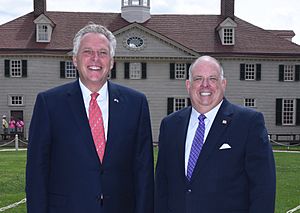
- Environment: McAuliffe believes that human activity causes global warming. He supports using clean energy like solar and wind power to reduce pollution.
- Gun Control: He supports stronger gun laws. This includes background checks for all gun sales and a ban on certain types of weapons.
- Healthcare: McAuliffe supports the Affordable Care Act. He tried to expand Medicaid in Virginia to provide health insurance to more people.
- LGBT Rights: He supports the rights of LGBT people, including same-sex marriage. He was the first Virginia governor to perform a same-sex wedding ceremony.
- Education: As governor, he signed a law to reduce the number of standardized tests in schools. He also vetoed bills that he felt would take control away from local school boards.
Personal Life
McAuliffe married Dorothy Swann in 1988. They live in McLean, Virginia, and have five children.
He has written two books. His first book, What a Party!, tells stories from his life in politics. One famous story is about how he wrestled an alligator to get a campaign donation for President Carter. His second book, Beyond Charlottesville, is about the 2017 rally and his stand against white nationalism.
Electoral history
- 2009
| Party | Candidate | Votes | % | |
|---|---|---|---|---|
| Democratic | Creigh Deeds | 158,845 | 49.77 | |
| Democratic | Terry McAuliffe | 84,387 | 26.44 | |
| Democratic | Brian Moran | 75,936 | 23.79 | |
| Total votes | 319,168 | 100.00 | ||
- 2013
McAuliffe ran unopposed in the 2013 Virginia gubernatorial Democratic primary.
| Party | Candidate | Votes | % | |
|---|---|---|---|---|
| Democratic | Terry McAuliffe | 1,069,859 | 47.75 | |
| Republican | Ken Cuccinelli | 1,013,355 | 45.23 | |
| Libertarian | Robert Sarvis | 146,084 | 6.52 | |
| Write-in | 11,091 | 0.50 | ||
| Total votes | 2,240,314 | 100.00 | ||
- 2021
| Party | Candidate | Votes | % | |
|---|---|---|---|---|
| Democratic | Terry McAuliffe | 307,367 | 62.10 | |
| Democratic | Jennifer Carroll Foy | 98,052 | 19.81 | |
| Democratic | Jennifer McClellan | 58,213 | 11.76 | |
| Democratic | Justin Fairfax | 17,606 | 3.56 | |
| Democratic | Lee J. Carter | 13,694 | 2.77 | |
| Total votes | 494,932 | 100.00 | ||
| Party | Candidate | Votes | % | |
|---|---|---|---|---|
| Republican | Glenn Youngkin | 1,663,158 | 50.58 | |
| Democratic | Terry McAuliffe | 1,599,470 | 48.64 | |
| Liberation | Princess Blanding | 23,107 | 0.70 | |
| Write-in | 2,592 | 0.08 | ||
| Total votes | 3,288,327 | 100.00 | ||
See also
 In Spanish: Terry McAuliffe para niños
In Spanish: Terry McAuliffe para niños
 | Jackie Robinson |
 | Jack Johnson |
 | Althea Gibson |
 | Arthur Ashe |
 | Muhammad Ali |


